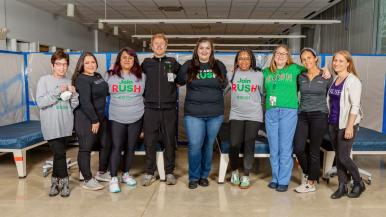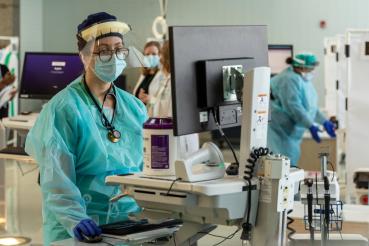After nearly two years, Rush University Medical Center and the Chicago Department of Public Health are closing the COVID-19 isolation shelter at A Safe Haven today. The closure is another sign of the waning urgency of COVID-19 as vaccination rates climb and new cases in the Chicago area decline. Nurses from the Office of Faculty Practice at Rush University College of Nursing have provided more than 28,525 hours of care to people at the shelter experiencing homelessness, helping to ensure that one of Chicago’s most vulnerable populations had access to desperately needed health care.
The isolation shelter opened in April 2020 as the rate of COVID-19 in Chicago, especially among those experiencing homelessness, began to rise. The Office of Faculty Practice responded to the emerging need to safely isolate those testing positive for the virus in congregate living facilities and accepted referrals from area hospitals to relieve the stress being put on emergency rooms. Nearly a dozen community health nurses from the office worked at the shelter to care for patients.
“We knew we had to step in for these patients,” says Angela Moss, PhD, MSN, APN-BC, RN, FAAN, assistant dean for Faculty Practice. “This is exactly what we are positioned to do.”
Moss says that the office’s nurses were called on to do more than treat the virus. “Our nurses are experts in community health and understand the complexities of caring for a patient who is not only facing health care needs because of COVID but might also have high blood pressure, diabetes, substance use disorders, mental health concerns, skin conditions and wounds or other chronic conditions for which they need care,” she says. “Although COVID is what brought them through the door, it is just one of the myriad challenges our shelter residents are facing.”
During the two years that the isolation shelter was operational, more than 1,100 people were admitted. The nurses and shelter staff had to respond quickly to react to surges, developing new tactics to keep residents safe along the way. During the omicron surge from December to January, the shelter reached capacity for several weeks, admitting 65 people to the facility.
“For many of us who worked in the shelter, I think we can say today is bittersweet,” says Christina Manheimer, FNP-C, APRN, lead nurse practitioner at the isolation shelter. “We are so thankful that the immediate needs for COVID-19 care have receded, but at the same time, this work has been incredibly rewarding. Not only because of the impact we had on patients but also because of the camaraderie with A Safe Haven, the Chicago Department of Public Health, our shelter partners and hospital systems across Chicago.”
Manheimer says that nurses were not the only ones whose efforts should be applauded. “None of our work would have been possible without the kitchen staff, janitorial team, security staff, night nurses, behavioral health team and monitors who provided comfort care to patients,” she says. “This truly has been a time of unity for all of us.”
The Office of Faculty Practice was established more than 40 years ago to care for people outside of a traditional health care setting. Today, the office has more than 25 community partner sites where nurses from the College provide on-site care with social service organizations. Most served by nurses from the Office of Faculty Practice come from diverse and historically underserved communities. More than 90% of patients self-identify as racial or ethnic minority groups, and the majority earn below the federal poverty line. For these reasons, many patients served by the office are unable to access reliable, quality care, and experience what David Ansell, MD, MPH, associate provost for community affairs at Rush, has coined the “death gap.” Only seven miles separate Chicago’s Loop and Near West Side, yet there is a 16-year life-expectancy gap between the two areas. The isolation shelter lent support to Rush’s health equity strategy, which is designed to address this gap.
Nurses from the College also provided more than 1,500 hours of educational training to nursing students. A critical component of the mission of the Office of Faculty Practice is to educate students about community health nursing. Nursing students took the lead in managing data entry and assisted in patient visits at the shelter. Rush University College of Nursing, whose master’s program is ranked No. 17 and doctor of nursing practice degree is No. 2 in the nation, emphasizes health equity education across its programs.
“Health equity is a critical part of our College’s strategic plan,” says Christine Kennedy, PhD, RN, FAAN, John L. and Helen Kellogg Dean of Rush University College of Nursing. “The work done by this team during the last two years has been revolutionary both in the lives of the patients they cared for and also for the students who were able to see firsthand the impact they can have on communities. We are all incredibly proud of the tenacity and passion these nurses embodied through their work.”
While the closure represents an important moment in the pandemic, nurses and other medical experts warn that there are still good reasons to remain vigilant against the virus. They recommend following the advice of Rush and other trusted sources and encourage anyone eligible to receive a booster.




